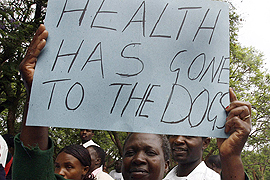Zimbabwe police stop health protest
Riot police prevent striking doctors from protesting over ailing health care system.

Speaking to the Reuters news agency, Simbarashe Ndoda, a representative of the striking doctors, said: “There are no drugs and people are dying, we want the government to address these issues.”
Commenting on pay conditions in the medical sector, Ndoda said: “This has to be the only country in the world where a doctor’s salary can only buy a loaf of bread. That is madness.”
Cholera outbreak
Meanwhile, the state-run Herald newspaper reported on Tuesday that cholera had killed 36 people since Friday in the town of Beitbridge on the South African border.
It said that 431 people had been diagnosed with the highly infectious intestinal disease.
The paper said the local hospital had cleared all its wards to make room for cholera victims but that there were not enough staff or equipment to cope.
Eleven bodies were “scattered all over the place” in the female wards because there was no room in the morgue, the paper reported.
 |
| Zimbabwe once had one of the best health systems in sub-Saharan Africa [AFP] |
It said health workers had no idea about the situation in surrounding rural areas because lack of fuel and transport prevented investigations.
Beitbridge is one of the regions busiest border crossings, with huge volumes of vehicles and people passing to South Africa to buy supplies that are impossible to find in Zimbabwe.
Even before the Beitbridge outbreak, more than 130 people had died from cholera, which is spread by contaminated food and water.
The disease is thriving in Zimbabwe because there is no money to maintain the sewage and draining systems, to clear garbage or supply clean water.
Warning
Aid groups fear the outbreaks will worsen as the rainy season progresses and the French charity Medecins Sans Frontieres (MSF), or Doctors Without Borders, has warned that 1.4 million people are at risk.
MSF said patients were lying outside on the grass at Harare’s infectious diseases hospital and the charity was putting up tents to cope.
Zimbabwe, which has one of the world’s worst Aids epidemics, once had one of the best health care systems in sub-Saharan Africa.
But the country’s economic meltdown has led to chronic shortages of food and gasoline, and daily outages of power and water.
Robert Mugabe, the country’s president, who has been in power since independence from Britain in 1980, blames Western sanctions for his country’s extreme financial woes.
But critics point to corruption and mismanagement under his increasingly autocratic leadership.